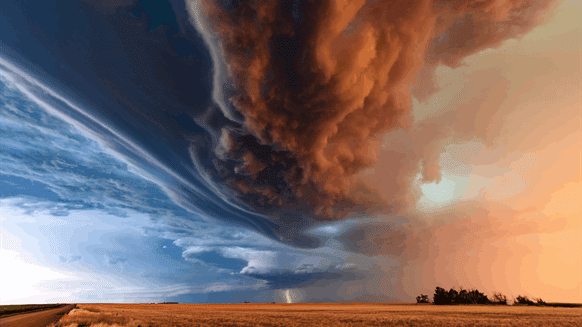Extreme weather can always pose a risk for oil and gas operations, Frederick J. Lawrence, the ex-Independent Petroleum Association of America (IPAA) Chief Economist, told Rigzone in an exclusive interview held recently.
“Two weather-related events to watch include hurricanes and extreme heat or cold temperatures, in addition to other one-off weather phenomena,” he added.
“In 2024, meteorologists have forecasted increased risk for the Atlantic hurricane season … This raises the prospect for weather related production outages for U.S. oil and natural gas operations,” Lawrence continued.
Lawrence highlighted to Rigzone that Hurricane Beryl was impacting power supply in the Texas region even last week. The hurricane made landfall in Texas on July 8.
“The storm impacted power for up to 2.7 million homes and outages continue for many as 250,000 were still without power on July 16,” Lawrence said.
“The storm impacted operations at several ports in addition to the high number of power outages which also impacted demand,” he added, noting that Freeport LNG was also impacted. A Freeport LNG spokesperson told Rigzone on Monday that the company was “safely progressing the restart of … [its] liquefaction trains”.
In the interview, Lawrence said the oil and gas industry must constantly improve its defense toward weather-related events and warned that more preparation and faster response will always be needed in addition to improved standards and resilience.
“Companies continue to integrate real time weather insights into their operation strategy in addition to hardening plants,” he added.
“Given the interconnectedness of the global oil and gas industry (with the U.S. weighing in as the top producer in addition to top oil and gas exporter), increased preparations for extreme weather events will remain a top priority given what appears to be an increased frequency and intensity of events according to groups that track weather-related incidents,” he added.
“This adds risk to markets given that both global oil and natural gas demand are forecast to grow in 2024 and geopolitical instability remains high as well,” he continued.
Alex Stevens, the Manager of Policy and Communications at the Institute for Energy Research (IER), told Rigzone in another exclusive interview that “hurricanes have always posed risks to oil and gas companies due to their potential impact on supply chain logistics, infrastructure, and extraction demands”.
“For instance, the Gulf Coast, where over half of oil refining and most natural gas exports occur, regularly faces challenges from hurricanes that disrupt supply chain management,” he added.
“Despite these ongoing threats and their historical and future impacts on the industry, continuous advancements in infrastructure and weather forecasting are key to staying ahead of predictable extreme weather events,” he continued.
Stevens highlighted to Rigzone that oil and gas companies have been actively advancing technologies to mitigate these risks.
“One significant development is the integration of artificial intelligence (AI) for analyzing operational data and predicting the impacts of weather events,” he pointed out.
Ellen R. Wald, the President of Transversal Consulting, told Rigzone in a separate exclusive interview that “extreme weather risks vary considerably for oil and gas companies depending on their location and type of production”.
“For example, the degree of danger from extreme weather for offshore drilling in the Gulf of Mexico is considerably higher than it is for unconventional gas drilling in the Marcellus Shale region in Pennsylvania,” Wald added.
“Due to the chance of a La Nina developing in the summer and fall of 2024, extreme weather risks are much higher for offshore drilling in the Gulf of Mexico. La Nina conditions make it more likely that hurricanes will develop and track into the Gulf of Mexico,” Wald continued.
“Offshore drilling platforms in this area will have to be evacuated in preparation for hurricane conditions and then after hurricanes pass, damages will have to be assessed and repaired for oil production to recommence,” Wald stated.
In a statement posted on its website back in May, the National Oceanic and Atmospheric Administration (NOAA) warned that its National Weather Service forecasters at the Climate Prediction Center predict above normal hurricane activity in the Atlantic basin this year.
The organization revealed in the statement that its outlook for the 2024 Atlantic hurricane season predicts an 85 percent chance of an above normal season. NOAA highlighted in the statement that it is forecasting a range of 17 to 25 total named storms, including four to seven major hurricanes.
Source: www.rigzone.com






